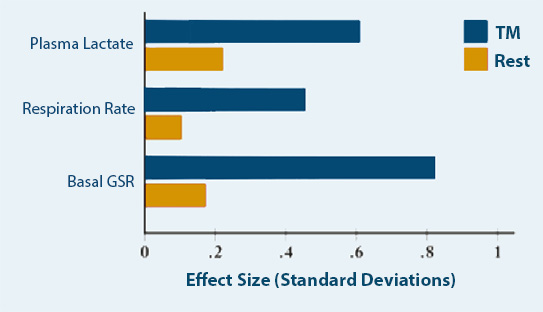The Transcendental Meditation® (TM) technique has been extensively researched over the past 45 years. It works to reduce stress and strengthen mind-body functioning generally. TM® can thus simultaneously reduce post-traumatic stress (PTS) symptoms and the negative conditions often associated with PTS — depression, anxiety, substance abuse, insomnia, pain. This page and its associated tabs summarize this body of research.
Please see “TM and PTSD White Paper” or “White Paper Summary” for review of all research.
TM differs from cognitively-based therapies in that it works on the neuro-physiological level. TM provides an exceptionally deep level of rest to the body. Because rest facilitates physical and mental healing, this deep level of rest allows the body to resolve stresses that the normal level of rest provided by sleep does not. Through the dual action of deep physiological rest, which neutralizes stress, and increased resilience to stress, the body is able to significantly reduce stress levels over time. As a result, stress-related problems improve.
Increased Physiological Relaxation
Meta-Analysis 32 Studies

American Psychologist, Vol 42(9), Sep 1987, 879-881
Nine Main Areas of Research on TM for Veterans
- PTSD
- Anxiety
- Depression
- Substance Abuse
- Insomnia
- Pain
- Blood Pressure
- Compared to Mindfulness Meditation
- Resilience/Peak Performance
PTSD
- TM has a strong impact on reduction of the symptoms of post-traumatic stress, similar to or greater than frontline PTSD therapies currently being used, such as Prolonged Exposure Therapy and Cognitive Processing Therapy.
- TM results come quickly, up to 50% reductions in symptoms as measured by the PTSD Check List (PCL) in the first month of practice.
- TM has no documented negative side effects. It is not trauma-based and does not involve painful reliving of past events.
- More >
Anxiety
- TM has been shown to be more effective than other behavioral techniques for reducing anxiety.
- While anxiety medications often have negative side effects, TM produces “side benefits” of greater alertness, reduced depression, and improved cognitive functioning.
- More >
Depression
- A recent study of 151 veterans and their partners found a 44% drop in an objective measure of depression symptoms over one month. Of the 118 participants who were above the clinical threshold for depression on the pre-test, 47% dropped below the threshold at one month. These results held over 6 months.
- More >
Substance Abuse
- More than two dozen studies have found that TM has significant effects on reducing substance abuse, including use of alcohol, cigarettes, and drugs.
- A meta-analysis has found that TM has a greater effect on reducing substance abuse than standard treatment and prevention programs.
- More >
Insomnia
- Studies have found TM to reduce insomnia in the general population, in veterans and in prisoners.
- A recent study of 143 veterans and their partners found a 26% improvement in sleep on the MOS Sleep scale over one month.
- More >
Pain
- Both psychological research measuring distress associated with pain and neurophysiological research on the brain’s response to pain have found 40-50% reductions in pain response after 3-5 months of TM practice.
- More >
Blood Pressure
- Numerous research studies have found practice of TM to significantly reduce blood pressure. As a result of these studies, the American Heart Association issued a scientific statement that “TM may be considered in clinical practice to lower BP.”
- More >
Compared to Mindfulness Meditation
- TM is easy to practice and produces different physiological effects than mindfulness.
- Research has shown that TM has larger effect sizes in reducing PTSD, anxiety, and blood pressure than mindfulness meditation.
- More >
Resilience/Peak Performance
- The Transcendental Meditation technique, through its effect on reducing stress and optimizing brain functioning, builds resilience to stress and enhances performance.
- Physiological research has shown that TM practitioners habituate more quickly to stressors and that they demonstrate less stressful responses to the same stressful situations over time.
- Cognitive research shows increased intelligence, creativity, and inner locus of control.
- More >
